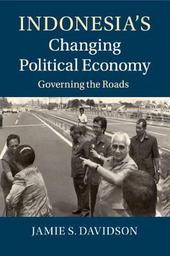
|
Indonesia's Changing Political Economy: Governing the Roads
Paperback / softback
Main Details
| Title |
Indonesia's Changing Political Economy: Governing the Roads
|
| Authors and Contributors |
By (author) Jamie S. Davidson
|
| Physical Properties |
| Format:Paperback / softback | | Pages:310 | | Dimensions(mm): Height 230,Width 153 |
|
| Category/Genre | International economics
Political economy |
|---|
| ISBN/Barcode |
9781107451735
|
| Classifications | Dewey:320.9598 |
|---|
| Audience | | Professional & Vocational | |
|---|
| Illustrations |
3 Tables, black and white; 8 Maps; 12 Halftones, unspecified; 12 Halftones, black and white; 1 Line drawings, black and white
|
|
Publishing Details |
| Publisher |
Cambridge University Press
|
| Imprint |
Cambridge University Press
|
| Publication Date |
8 March 2018 |
| Publication Country |
United Kingdom
|
Description
Indonesia is Southeast Asia's largest economy and freest democracy yet vested interests and local politics serve as formidable obstacles to infrastructure reform. In this critical analysis of the politics inhibiting infrastructure investment, Jamie S. Davidson utilizes evidence from his research, press reports and rarely used consultancy studies to challenge mainstream explanations for low investment rates and the sluggish adoption of liberalizing reforms. He argues that obstacles have less to do with weak formal institutions and low fiscal capacities of the state than with entrenched, rent-seeking interests, misaligned central-local government relations, and state-society struggles over land. Using a political-sociological approach, Davidson demonstrates that 'getting the politics right' matters as much as getting the prices right or putting the proper institutional safeguards in place for infrastructure development. This innovative account and its conclusions will be of interest to students and scholars of Southeast Asia and policymakers of infrastructure investment and economic growth.
Author Biography
Jamie S. Davidson received his Ph.D. in Political Science from the University of Washington, and is currently Associate Professor of Political Science at the National University of Singapore. His previous books include From Rebellion to Riots: Collective Violence on Indonesian Borneo (2008) and The Revival of Tradition in Indonesian Politics: The Deployment of Adat from Colonialism to Indigenism (with David Henley, 2007).
Reviews'This book is at once a powerful political analysis of democratic Indonesia's decade-long struggle to build a trans-Java expressway and a significant original contribution to the new institutional economics theoretical literature. It is must-reading for Indonesia's newly elected government and for policy makers throughout the developing world.' R. William Liddle, Ohio State University 'This excellent book offers the most richly detailed and illuminating account of shifts in the political economy of development in Indonesia since the fall of Suharto in 1998. Davidson's close, careful analysis represents a pioneering study, both of authoritarian and post-authoritarian Indonesia and of infrastructure politics in the developing world in general. The book will be of immense value for its insights on the changing political economy of Indonesia and for its implications - and the example it sets - for scholars interested in the political economy of development elsewhere around the world.' John T. Sidel, London School of Economics and Political Science 'This is a sophisticated and powerful book about the government's attempt to rejuvenate investment in the toll-road sector and to embed the ideas and institutions of 'regulatory capitalism' replacing old style 'political capitalism'. Davidson sheds new light on the struggles between different versions and types of capitalism both outside and within the developing world.' David Levi-Faur, Hebrew University of Jerusalem '... [this book] is rich in detailed examples and exhibits a wide-ranging grasp of the Indonesian and international literature dealing with the themes of the book as well as incorporating extensive interviews with key actors in the mega-project ... This is a valuable study that provides important evidence of the need to develop broader conceptual understandings of the processes of transportation development ...' T. G. McGee, Pacific Affairs
|